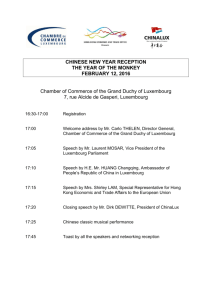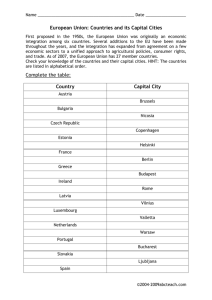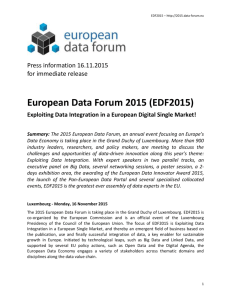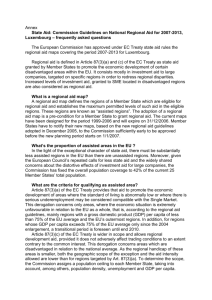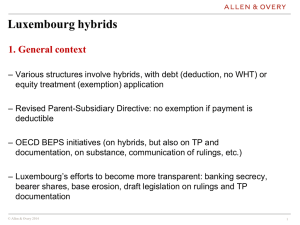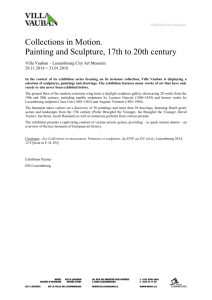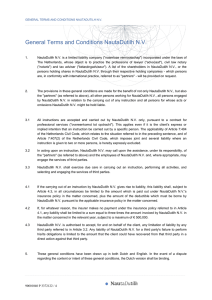NautaDutilh
advertisement
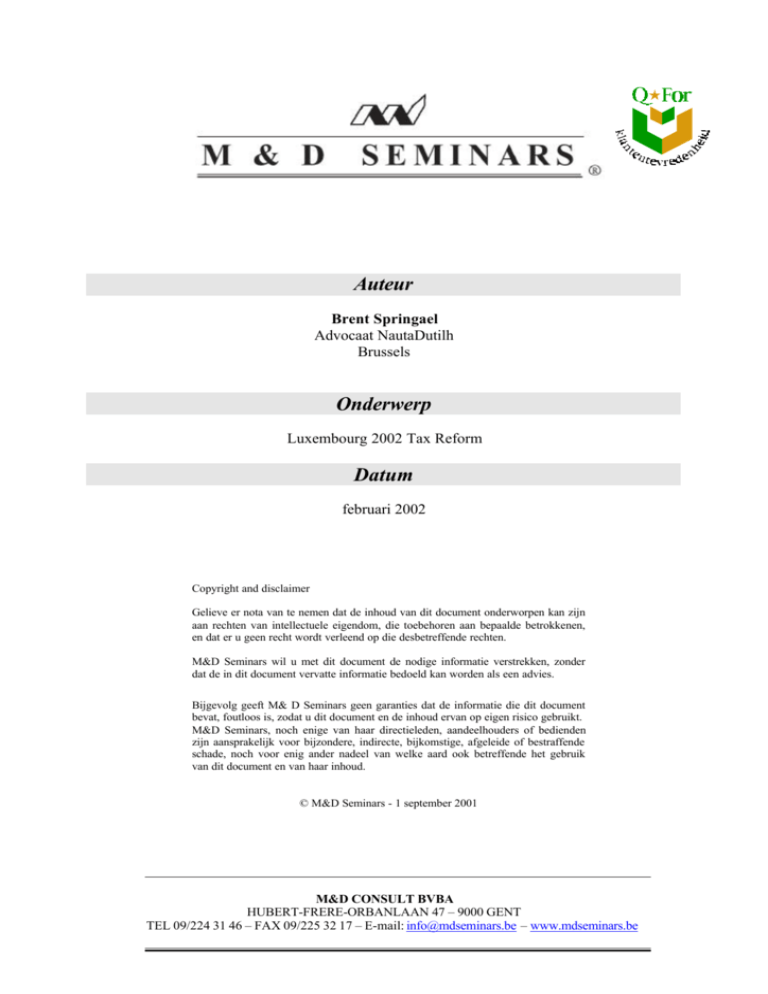
Auteur Brent Springael Advocaat NautaDutilh Brussels Onderwerp Luxembourg 2002 Tax Reform Datum februari 2002 Copyright and disclaimer Gelieve er nota van te nemen dat de inhoud van dit document onderworpen kan zijn aan rechten van intellectuele eigendom, die toebehoren aan bepaalde betrokkenen, en dat er u geen recht wordt verleend op die desbetreffende rechten. M&D Seminars wil u met dit document de nodige informatie verstrekken, zonder dat de in dit document vervatte informatie bedoeld kan worden als een advies. Bijgevolg geeft M& D Seminars geen garanties dat de informatie die dit document bevat, foutloos is, zodat u dit document en de inhoud ervan op eigen risico gebruikt. M&D Seminars, noch enige van haar directieleden, aandeelhouders of bedienden zijn aansprakelijk voor bijzondere, indirecte, bijkomstige, afgeleide of bestraffende schade, noch voor enig ander nadeel van welke aard ook betreffende het gebruik van dit document en van haar inhoud. © M&D Seminars - 1 september 2001 M&D CONSULT BVBA HUBERT-FRERE-ORBANLAAN 47 – 9000 GENT TEL 09/224 31 46 – FAX 09/225 32 17 – E-mail: info@mdseminars.be – www.mdseminars.be l NautaDutilh Luxembourg 2002 Tax Reform Brent Springael, NautaDutilh Brussels Luxembourg is often used as an intermediary step for international tax planning. Luxemburg now strengthens its European competitive position by reducing the tax rate and broadening the application of the participation exemption regime, amongst others. two commercial companies to the above, namely the European Economic Interest Grouping (the EEIG) and the Luxembourg equivalent thereof (the EIG). Tax Rates Brief legislative history a. corporate income tax 5 The Luxembourg Tax Reform of 2002 is regulated by a Law and a Grand-Ducal Decree (Règlement grand-ducal) (hereinafter collectively referred to as the Reform Regulation). The bill of the Reform Regulation was introduced in Luxembourg Parliament on October 12, 2001 and was approved on December 21, 2001. 1 The Reform Regulation concerns both individual as corporate tax, and a few other indirect taxes, such as net worth tax, registration duties and subscription tax. This article mainly treats the corporate tax highlights. The tax rates are reduced from 30% down to 22% for businesses with an income superior to EUR 15,000. Businesses with a lower income may benefit an even more reduced rate with a minimum of 20%. Taking into account the 4% employment fund contribution, 6 the effective corporate tax rate is reduced from 31.2% down to 22.88%. 7 Tax Transparency b. municipal business tax 8 Aside from the corporate income tax, all companies are subject to a municipal business tax. For the City of Luxembourg (and most other municipalities) the effective tax rate is reduced from 9.09% to 7.5%. 9 2 The corporate tax rules are not applicable to certain collective commercial companies 3 that are lacking a separate legal personality for tax purposes. 4 Since these companies are no tax autonomous entities, they are tax transparent and, therefore, not subject to corporate tax. The Reform Regulation now clearly enunciates the tax transparency rules and explicitly adds Taking both taxes into account, the effective combined income tax rate for companies located in the City of Luxembourg is reduced from 37.34% to 30.38%, including the contribution to the employment fund. 5 Impôt sur le Revenu des Collectivités. Contribution pour le Fond d’Emploi. 7 Article 173 LITC. 8 Impôt commercial communal. 9 The composition of the effective tax rate is rather unusual to the extent that the tax rate remains unchanged, i.e. 250%, but that the tax base rate is reduced. The taxable basis, for the purpose of this municipal tax, is reduced from 4% to 3% of the taxable net income. Further, the municipal business tax is no longer deductible from the corporate income tax and from its own taxable basis. 6 1 Luxembourg State Gazette (Memorial) 2001, December 27, 2001, A - n° 157, p.3311-3332 – to see publication online: http://www.etat.lu/memorial/memorial/a/2001/a1572712.pdf. 2 Article 175 Luxembourg Income Tax Code (LITC). 3 Specifically are concerned the “société en nom collectif”, the “société en commandite simple” and the “société civile”. 4 From a Luxembourg corporate law point of view, these companies do have a separate legal personality. -1- l NautaDutilh Contrary to the announced tax reform in Belgium, the Luxembourg reform is not budgetary neutral. This means that the essential tax rate reduction is not compensated by other measures aiming at broadening the taxable basis. On the contrary, several measures are devised to give a broader application to some favorable tax regimes. from a similar foreign tax. Such participations cannot benefit from the participation exemption. Dividends received from such participations are nevertheless eligible for a 50 percent exemption. - Withholding tax One of such measures was to reduce the withholding tax on dividends from 25% to 20%.10 11 The withholding tax on royalties paid to non-resident companies or Luxembourg 1929 holdings is uniformly fixed at 10%. 12 13 The Reform Regulation enables the possibility of a tax neutral share exchange (see further below). When a non-qualifying participation is transformed into a qualifying participation via such share exchange transaction (e.g. pursuant to a merger), the participation will be deemed to be a non-qualifying participation during the five fiscal years following the year in which occurred the share exchange. Participation exemption Further, the Reform Regulation aimed at enlarging the possibility to benefit from the participation exemption, applicable on dividend income and capital gains on shares. b. a. qualifying versus non-qualifying participations Dividends 15 In principle, dividends received are only eligible for the participation exemption, if they proceed from a ‘direct’ qualifying participation. Based on the former legislation, dividends received from participations held (indirectly) through tax transparent entities (see above), in principle, did not qualify for the participation exemption regime. Nevertheless, it was a common practice of the Luxembourg tax administration to treat such dividends as originating from a ‘direct’ participation, but subject to the condition of a certain minimum participation in the tax transparent entity. Pursuant to the Reform Regulation, such dividends are now explicitly deemed derived NORMAL For the application of the participation exemption, distinction has to be made between qualifying participations (participations qualifiées) and non-qualifying participations (participations non-qualifiées). - Qualifying participations are participations in a (Luxembourg or foreign) share capital company subject to (Luxembourg or similar foreign) corporate income tax, or in a qualifying company for the purposes of the EU Parent-Subsidiary Directive. 14 Non-qualifying participations are participations in companies that are partially or fully exempt from Luxembourg corporate income tax or 10 Article 148-1 LITC. Article 146 LITC subjects dividends as defined by article 97 LITC to withholding tax. Liquidation gains, however, are not considered as dividend distributions for the purposes of article 97 LITC, but as capital gains, and are thus not subject to withholding tax. 12 Article 152 LITC. 13 Under the former legislation, this 10% withholding tax was only applicable to author’s rights with respect to literary or artistic works. The general rate was 12%. 11 14 DIVIDEND – Article 2 of the EU Council Directive (90/435/EEC) of June 23, 1990, on the common system of taxation applicable in the case of parent companies and subsidiaries of different Member States, OJ L 225, 22.9.1990, p.6. 15 Article 166 LITC. -2- l NautaDutilh from a ‘direct’ participation proportionally to the fraction held in the invested net assets of the transparent entity, and therefore, eligible for the participation exemption, to the extent that they also meet the other conditions. subsidiary rebuilds its retained earnings, the value adjustment of the participation must be reversed. Under the former legislation, such subsequent reversal could not benefit from an exemption or deferred taxation and constituted another tax burden for the parent company. The Reform Regulation remedies this situation by stating that such subsequent reversal is a deemed dividend, eligible for the participation exemption if and to the extent a pre-acquisition dividend was paid and an equal reduction of value was booked. Aside from the conversion into Euro, the other conditions remained unchanged: the participation must entail at least 10 percent in the share capital of the subsidiary or have an acquisition value of at least EUR 1.2 million. Further, the participation must be held for at least 12 months (not necessarily prior to the dividend distribution). The Reform Regulation introduced an anti-abuse provision according to which a 5 year “waiting period” is imposed for dividends derived from a “via an exchange of shares transformed” qualifying participation (see above under point a), in order to benefit from the participation exemption. DIVIDEND AFTER SHARE EXCHANGE – The companies that can invoke the exemption regime are Luxembourg share capital companies subject to corporate income tax, states and public institutions, permanent establishments of qualifying companies for the purposes of the EU Parent-Subsidiary Directive, and permanent establishments of foreign companies resident in a state which concluded a bilateral tax treaty with Luxembourg. c. Capital gains on shares 16 The exemption regime for capital gains on shares is relaxed and tuned to the regime applicable to the dividends. As such, the participation regime applies to capital gains realized on a qualifying participations 17 18 (see above under point a) held directly or indirectly through tax transparent entities and the minimum participation is reduced from 25% to 10%. The minimum acquisition value is round down from LUF 250 million to EUR 6 million. 19 NORMAL CAPITAL GAIN – A pre-acquisition dividend is a dividend distributed from the retained earnings of the subsidiary build up prior to the acquisition of the subsidiary, and therefore in principle part of the acquisition price of the participation. When such preacquisition dividend is distributed, e.g. to pay off the debt engaged by the parent company to acquire the participation, such dividend does not qualify for the participation exemption: Luxembourg tax law does not allow an exemption if and to the extent a value adjustment on the acquisition price has been booked. Nevertheless, such dividend is not effectively taxed, since the company will have to book a value reduction on the participation, equal to the (pre-acquisition) dividend received, which is tax deductible. Under Luxembourg law, participations have to be revaluated when their fair market value is higher or lower than the book value, but the value adjustment can not be higher than the acquisition value. This means that if the PRE-ACQUISITION DIVIDEND – Further in order to benefit from the exemption regime, the requirement of uninterrupted holding or engagement to continue to hold uninterruptedly shares for a period of 12 months must still be met, but no longer on a share-by16 Article 1 Grand-ducal Decree jo. article 166 LITC. Article 166, paragraph 2 LITC. 18 Under the former legislation, the exemption regime was limited to participations in fully-taxable Luxembourg share capital companies and foreign companies subject to taxation similar to the Luxembourg corporate income tax. 19 It is remarkable that only the minimum participation is tuned to that for dividends, but not the minimum acquisition value, which is EUR 1.2 million for dividends. 17 -3- l NautaDutilh share basis. It is sufficient to hold a stock of shares representing the minimum holding percentage (10% or EUR 6 million). The overhead participation can be disposed of without any further holding requirement. Tax consolidation 23 The optional regime of tax consolidation allows to set off the losses against the profits realized by the companies within the periphery of the tax consolidation and assures the neutrality of the legal structure of the group, which forms a unity from an economic point of view. The legislator understood that this principle actually overleapt itself by requiring a 99 percent participation, in order to be integrated in the tax consolidation. The legislator remedied this situation by stipulating that the parent company must hold (directly or indirectly) at least 95% in the share capital of its subsidiaries. Under former legislation, only fully-taxable Luxembourg companies were able to invoke the exemption regime. By referring to the rules applicable to dividends, the Reform Regulation extended the exemption regime to capital gains realized by states and public institutions, permanent establishments of qualifying companies for the purposes of the EU ParentSubsidiary Directive, and permanent establishments of foreign companies resident in a state which concluded a bilateral tax treaty with Luxembourg. 20 Pursuant to several decisions of the European Court of Justice, 24 the legislator considered it necessary to allow applicability of the tax consolidation regime, not only to the Luxembourg resident corporations, but also to the Luxembourg permanent establishments of foreign companies subject to an income tax similar to Luxembourg income tax. The European Court ruled that excluding a permanent establishment of a foreign company, constituted an infringement of the nondiscrimination principle regarding the freedom of establishment, pursuant to article 43 of the EU Treaty. When a business or an autonomous part of a business was contributed to a company in exchange for shares pursuant to the roll-over relief regime 21 (see tax free reorganizations below) at a value below market value, this part of any gain on the shares was not eligible for the participation exemption on the ultimate disposal of the obtained shares. The Reform Regulation removed this “recapture” rule 22 for capital gains qualifying for the participation exemption. CAPITAL GAIN AFTER ROLL-OVER RELIEF – The Reform Regulation introduced an anti-abuse provision according to which a 5 year “waiting period” is imposed, in order to benefit from the participation exemption for capital gains on shares from a “via an exchange of shares transformed” qualifying participation (see above point a). Tax free reorganizations CAPITAL GAIN AFTER SHARE EXCHANGE – Mergers, demergers and similar operations constitute for the contributing companies, in principle, the transfer or the ceasing of the enterprise and trigger immediate taxation of any hidden capital gain. In order to encourage company restructurings, and subject to certain conditions, companies can benefit from a tax deferral regime. In general, the tax neutral restructuring is accepted when the recipient company applies in its PRINCIPLE – 20 Article 166, paragraph 1 LITC. Article 59 LITC. 22 This “recapture” rule was introduced by the Grand-Ducal Decree of December 24, 1990, but is no longer reflected in the new Grand-Ducal Decree of December 21, 2001. 21 23 Article 164bis LITC. ECJ, September 21, 1999, Case C-307/97, Compagnie de Saint-Gobain, Rec.1999, p.I-6161; to see the judgement online, http://www.europa.eu.int/cj/common/recdoc/indexaz/en/c2.htm. 24 -4- l NautaDutilh bookkeeping the accounting values as they appear in the balance sheet of the contributing company. 25 A similar roll-over relief is applied for crossborder restructurings involving EU companies. 26 This article replaces the principle of “Tauschgutachten”, a jurisprudential principle according to which a share exchange does not result in the realization of capital gains, if the exchanged assets (shares) are economically identical, i.e. if they carry the same value, the same nature and the same function. This principle was applied by the Luxembourg tax administration upon request by the tax payer, but since this was a rather subjective matter and often led to discussion, the legislator decided to replace this principle with a statutory provision, article 22bis. 27 When a company emigrates outside Luxembourg in consequence of a restructuring, i.e. when its registered office or head office has been transferred abroad, the emigration is treated as a deemed fiscal liquidation and hidden capital gains will be taxed, unless the net assets remain attached to a Luxembourg permanent establishment and are valued at book value. 28 29 EMIGRATION – The newly introduced article enunciates the nonrealization of hidden gains for 4 specific exchange operations: - the issuance of shares for the exercise of convertible bonds; - the conversion from one company form into another; - a merger or demerger of a Luxembourg or EU share capital company; - the acquisition of shares conferring or enhancing the majority of votes in the acquired company. The Reform Regulation further clarifies that in the event of a tax neutral merger, demerger or contribution, assets are deemed acquired by the recipient company at the initial acquisition date of the contributing company. This clarification is important for the computation of the 12 month holding period for the purposes of the participation exemption. ASSET ACQUISITION DATE – Share exchange 30 Investment tax credit At shareholder level, certain restructurings result in an exchange of shares. Starting point of the Reform Regulation is that capital gains realized upon the share exchange are in principle taxable, unless the newly inserted article 22bis explicitly deviates from it. 31 The Reform Regulation devoted a lot of attention to the tax credit for investments in order to encourage companies to invest and consequently create a favorable economic environment. Changes introduced at this level are (i) the reduction of the depreciation period of eligible assets 32 from 4 to 3 years, (ii) the explicit exclusion of used assets and (iii) the abolition of exclusion of low value assets (with an acquisition price inferior to LUF 35.000). On the other hand, the investment tax credit for 25 Articles 22, 54, 59, 170, 171 and 172 LITC. Articles 59bis, 170bis, 170ter and 172bis LITC. 27 The EU Merger Directive was already to a large extent implemented in the Luxembourg Income Tax Code, but the Reform Regulation completed this implementation. Also in view of the readability of the legislative texts, a clear distinction has been made between purely national transactions and crossborder transactions. 28 Article 172 LITC. 29 This principle will probably be applied in many EU countries, especially in the light of the European Company Regulation dated October 8, 2001. Pursuant to this Regulation, such company will be able to transfer its registered / head office abroad or merge across the border. 30 Article 22bis LITC. 26 31 Article 152bis LITC. The bill of the Reform Regulation envisaged an extension of applicability to certain intangible assets, such as patents and software, but this was not recorded in the final Reform Regulation. 32 -5- l NautaDutilh complementary investments is reduced from 12% to 10%. 33 duties over immovable property. When a shareholder of a company, not subject to corporate income tax and owning immovable property situated in Luxembourg, transfers (part of) his shares in that company for valuable consideration, such transfer will be assimilated with a proportional sale of the immovable property for the purpose of levying registration duties. Indirect taxes a. net worth tax Luxembourg companies are subject to an annual net worth tax of 0.5%. Prior to the tax reform, the net worth tax was creditable against the corporate income tax and the credit was limited to this corporate income tax after eventual other credits. c. subscription tax For the investment funds, that are subject to a subscription tax (taxe d’abonnement), the tax rate has been reduced from 0.06% to 0.05%. The Reform Regulation reversed the situation so that the net worth tax can be reduced with the corporate income tax, limited to the corporate income tax before eventual other credits. Conclusion The Luxembourg 2002 Tax Reform is not budgetary neutral, given the tax rate reduction and the clarification and broadening of the participation exemption regime, without expanding the tax base. With these measures, together with the unchanged beneficial regimes, such as the exemption of liquidation gains, a wide range of bilateral tax treaties, etc., Luxembourg enhances its competitive position in Europe and underscores its interesting regime for international tax planning. This is a considerable improvement for foreign parent companies with a Luxembourg subsidiary, that have their registered or head office in a country allowing a foreign income tax credit, but not a foreign net worth tax credit. When Luxembourg corporate income tax was reduced by the credit of the net worth tax, such foreign companies saw their foreign income tax credit diminished. b. registration duties In order to put the sale of immovable property and the transfer of shares of a company on equal terms, and in order not to penalize, from a tax perspective, the sale of real property with respect to the transfer of shares, a legislative modification was imposed. 34 Therefore, the Reform Regulation inserted an anti-abuse provision regarding the proportional registration 33 Initially, the bill of the Reform Regulation intended a reduction down to 8.4%. 34 Pursuant to the law of August 7, 1920, transfer of immovable property is subject to a 5% registration duty, excluding the 2/10 surcharge. Contribution of real property in a collective commercial company only triggers a 1% registration duty and the transfer of shares is merely subject a lump-sum registration duty, since the proportional registration duties thereon have been lifted by the law of December 29, 1971. NautaDutilh is a leading law firm on the European continent with close to 500 attorneys, civil law notaries and tax advisers. For more information about Belgian or Luxembourg tax issues, contact Mr. Werner Heyvaert or Mr. Brent Springael, attorneys at law with NautaDutilh in Brussels, by telephone at 32-2673-0007 or by email at werner.heyvaert@nautadutilh.com or brent.springael@nautadutilh.com -6-
